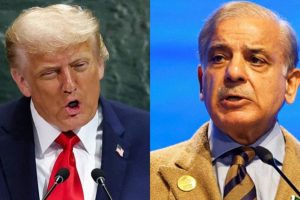Iran’s Supreme Leader Ayatollah Ali Khamenei has delivered a stern rebuke to U.S. President Donald Trump’s call for an “unconditional surrender,” warning that any American military intervention in the growing Israel-Iran conflict would lead to irreversible consequences.
In a nationally televised address, Khamenei declared, “The Iranian nation cannot be surrendered. Intelligent people who know Iran, its nation, and its history, will never speak to this nation in the language of threats.”
The warning comes amid rapidly intensifying hostilities between Iran and Israel. According to The New York Times, Khamenei’s response was prompted by Trump’s provocative remarks suggesting possible military action — and even floating the idea of assassinating Khamenei, though he quickly backtracked, saying he had “no plans for now.”
Despite the increasingly hostile rhetoric, both Washington and Tehran have sent contradictory signals on possible diplomatic engagement. Trump claimed Iran had shown interest in talks and hinted at a future nuclear deal, stating, “Nothing’s too late.”
However, Iran’s mission to the United Nations categorically denied seeking negotiations, issuing a scathing response: “Iran does NOT negotiate under duress, shall NOT accept peace under duress, and certainly NOT with a has-been warmonger clinging to relevance.”
A senior Iranian Foreign Ministry official, however, told The New York Times off the record that Foreign Minister Abbas Araghchi may be open to U.S.-brokered ceasefire talks with Israel. The development comes as three Iranian aircraft were tracked landing in Oman—a key intermediary between Tehran and Washington—raising speculation about backchannel diplomacy.
Meanwhile, Israel has escalated its military offensive, conducting a wave of precision airstrikes on Iranian territory. According to The New York Times, the Israeli Air Force has destroyed multiple high-value targets, including nuclear facilities, missile launch sites, and workshops for centrifuge production. At least 50 strategic locations in Tehran alone were reportedly hit.
Among the casualties are several senior Iranian military commanders and nuclear scientists—strikes that have infuriated Iran’s leadership and prompted a retaliatory barrage of ballistic missiles and drones launched at Israel. Most of the incoming projectiles were intercepted by Israel’s missile defense systems, but the exchanges have heightened fears of an all-out regional war.
In anticipation of further escalation, the U.S. Embassy in Jerusalem has started facilitating the evacuation of American citizens. The situation on the ground remains volatile, with both sides bracing for what could become a prolonged and highly destructive conflict.
Israeli Prime Minister Benjamin Netanyahu, addressing the nation, expressed gratitude to Trump for his unwavering support. “We talk continuously, including last night. We had a very warm conversation,” Netanyahu said, emphasizing national unity and Israel’s resolve to counter Iran’s nuclear ambitions.
As the conflict intensifies and diplomatic options dwindle, the region teeters on the brink, with global leaders and citizens alike anxiously watching for the next move.





